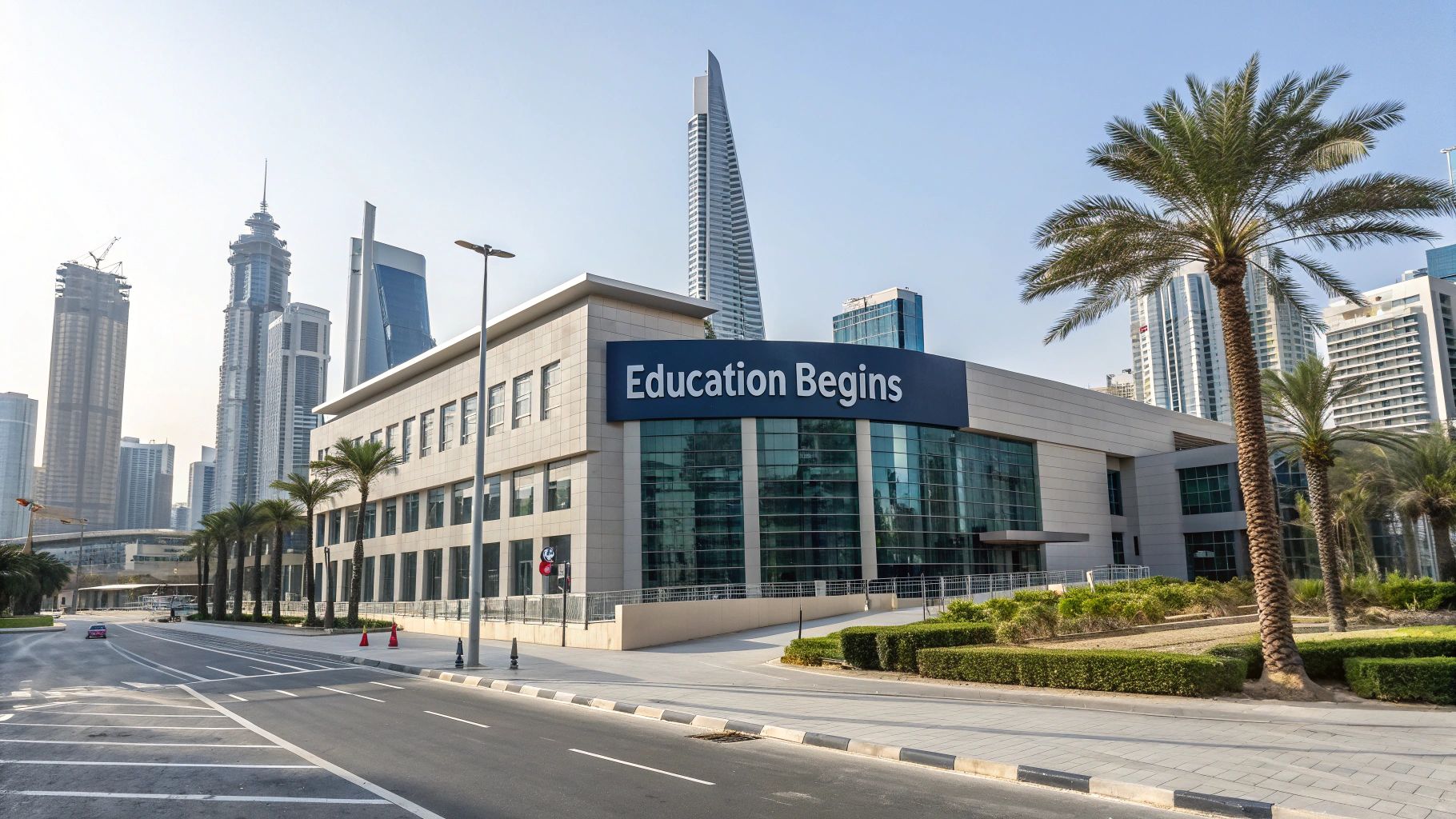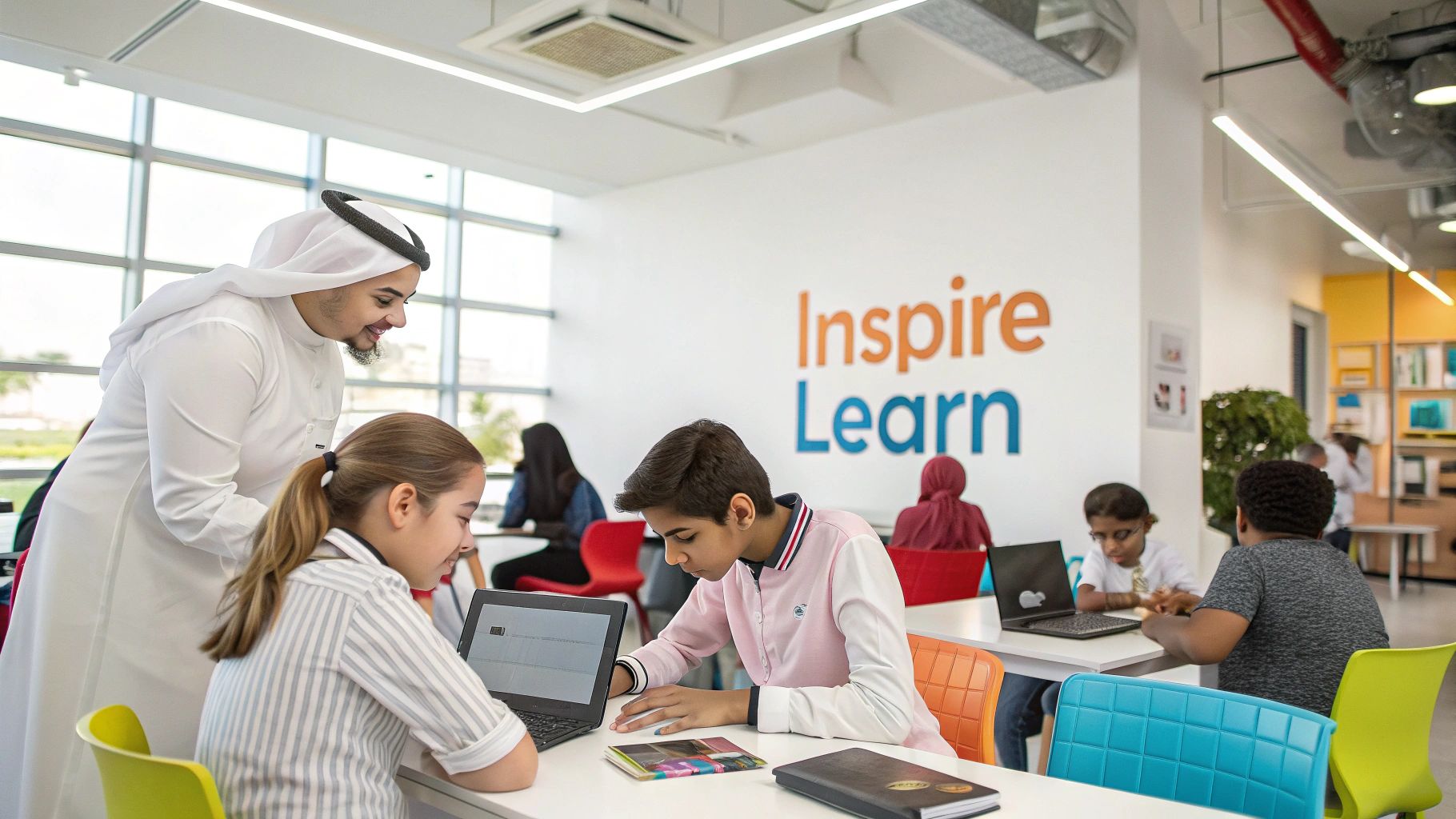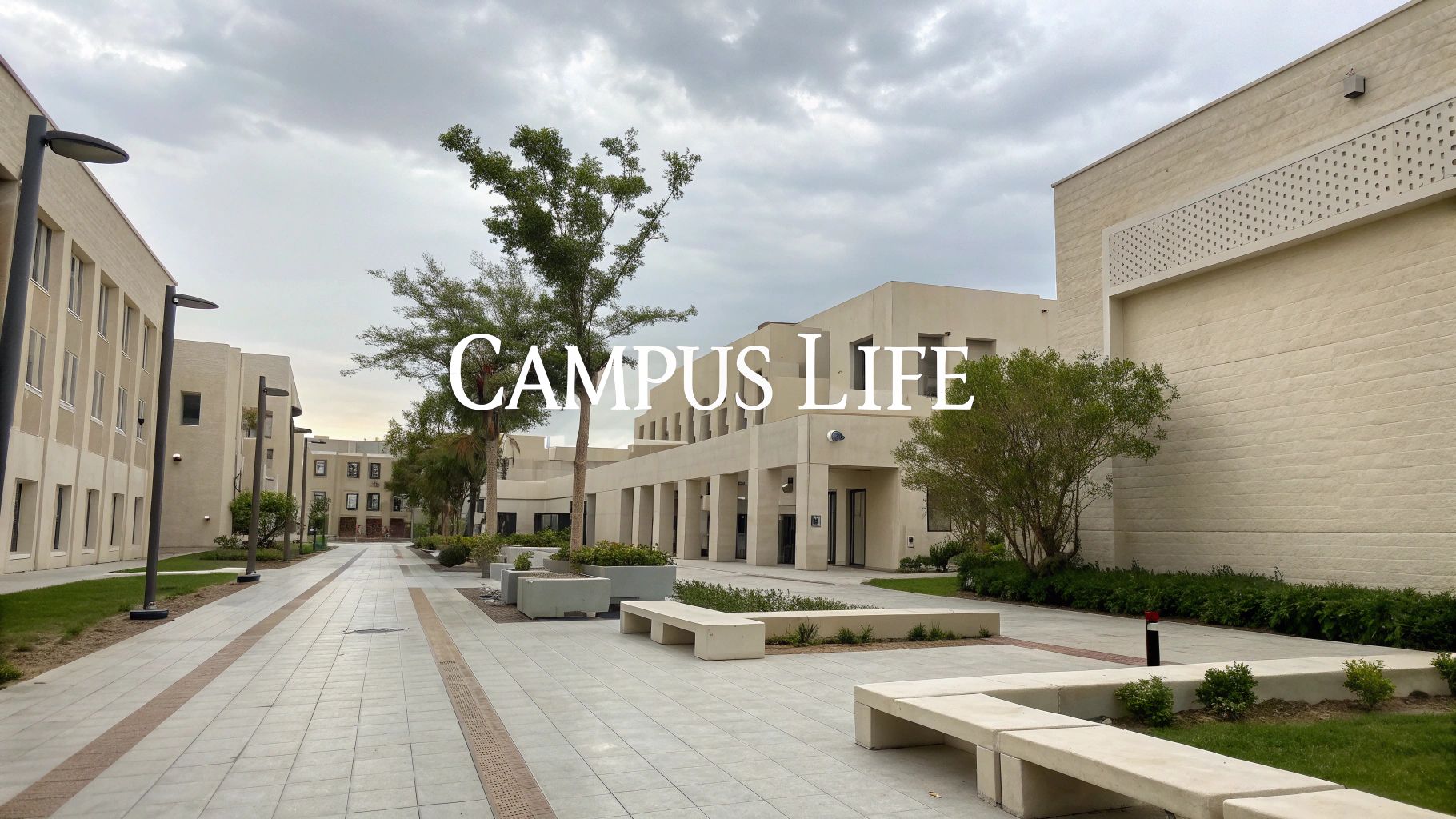
B Ed Course in UAE: Kickstart Your Teaching Career
The Evolution of B Ed Programs in UAE's Education Landscape

The UAE has demonstrated a strong commitment to education, evident in the significant advancements in its education system over recent decades. This progress underscores the nation's dedication to nurturing human capital and building a world-class learning environment. A crucial component of this growth is the development of comprehensive B Ed programs. These programs aim to equip educators with the skills and knowledge needed to excel in the classroom.
This emphasis on education is reflected in the rising number of individuals pursuing higher education. As of 2022, an impressive 51.1% of the UAE population aged 25 and above held at least a bachelor's degree. This statistic highlights the nation's focus on educational attainment. You can find more detailed statistics on educational attainment here: https://www.statista.com/statistics/1346188/countries-world-highest-share-bachelors-degree/
Adapting to a Multicultural Environment
B Ed courses in the UAE are increasingly designed to address the country's unique multicultural context. This focus equips future teachers with the skills to cultivate inclusive classrooms that cater to students from diverse backgrounds. The curriculum emphasizes culturally sensitive teaching methods and the integration of diverse perspectives. This approach ensures that every student feels valued and respected, fostering a strong sense of belonging.
Balancing Theory and Practice
Contemporary B Ed programs in the UAE prioritize a balanced approach between theoretical knowledge and practical experience. Students gain a deep understanding of pedagogical theories and educational psychology. They also participate in hands-on learning through practicums and internships at local schools. This combination prepares aspiring teachers with both the theoretical grounding and the practical skills needed to thrive in a real-world classroom setting.
Specialization and Career Pathways
Specialized B Ed programs have emerged to meet the rising demand for teachers with expertise in specific fields. These specializations include early childhood education, special education, and secondary subject specializations. This allows aspiring educators to tailor their studies to their specific interests and career aspirations.
This specialization within B Ed programs not only benefits individual teachers but also enhances the overall quality of education in the UAE. By having highly qualified professionals in key subject areas, schools can provide a richer and more comprehensive learning experience for all students. Furthermore, these specialized courses provide clear career pathways for graduates, opening doors to diverse and fulfilling opportunities within the education sector.
Finding Your Perfect B.Ed. Institution in the Emirates

Choosing the right B.Ed. program in the UAE is a pivotal decision for aspiring teachers. It's about more than just picking a university; it's about investing in your future career. This means looking beyond the initial program information and delving into the specifics of each institution. The ultimate goal is to find a program that truly aligns with your personal career aspirations and preferred learning style.
Key Factors to Consider
Several critical factors should guide your evaluation of potential B.Ed. institutions. Faculty credentials, for instance, provide valuable insights into the quality of instruction. Seek out institutions with experienced professors actively engaged in research and practical application within the field of education. Graduate employment rates are another significant indicator. A high placement rate suggests that the program effectively prepares graduates for the demands of the job market.
Furthermore, consider the strength of the institution's industry partnerships. Connections with local schools and educational organizations can open doors to invaluable networking opportunities and hands-on experience. These partnerships often lead to internships and job placements after graduation.
Beyond the Surface: Deeper Evaluation
While program brochures and websites offer a starting point, it's essential to delve deeper into your research. Alumni feedback can provide invaluable, real-world perspectives on the program’s strengths and weaknesses. Connecting with alumni through professional networking sites like LinkedIn or attending university events can offer firsthand insights.
Employer perspectives are equally crucial. Research which institutions employers favor and the qualities they seek in B.Ed. graduates. This knowledge helps you select a program that equips you with the skills and knowledge valued by employers. Finally, accreditation is paramount. Ensure the chosen program is accredited by a recognized body, guaranteeing it meets specific quality standards.
To help you compare some of the top programs, we've compiled the following table:
Top B.Ed. Programs in UAE
Comparison of leading universities offering Bachelor of Education degrees in the UAE
| University | Program Duration | Accreditation | Specializations | Tuition (AED) | Practical Hours |
|---|---|---|---|---|---|
| University A | 4 years | Accreditation Body A | Early Childhood Education, Special Needs Education | 200,000 | 500 |
| University B | 4 years | Accreditation Body B | Primary Education, Secondary Education | 220,000 | 600 |
| University C | 4 years | Accreditation Body A | Early Childhood Education, Teaching English as a Foreign Language (TEFL) | 180,000 | 400 |
This table provides a simplified example. Actual tuition fees, specializations, and practical hours may vary. Please consult individual university websites for the most up-to-date information.
As you can see, the universities offer various specializations and have different tuition fees and practical hour requirements. It's important to weigh these factors against your own needs and preferences.
Scholarships and Specialized Tracks
Many institutions offer scholarships and financial aid to B.Ed. students, making education more accessible. Researching these options early in your search process is highly recommended. Explore whether institutions offer specialized tracks within the B.Ed. program. These specializations, such as early childhood education, special needs education, or subject-specific areas, can significantly enhance your career prospects and allow you to focus your expertise.
Making an Informed Decision
By carefully considering these factors and conducting thorough research, you can make a well-informed decision about which B.Ed. institution in the UAE best suits your individual needs. This investment in your education is a crucial step toward a fulfilling and successful teaching career. Remember, selecting the right B.Ed. course isn't simply about obtaining a degree; it’s about building a strong foundation for your future as an educator.
Cracking the B.Ed Admission Code: What Really Works

Securing a coveted spot in a Bachelor of Education (B.Ed) program in the UAE takes more than just ticking the boxes of minimum requirements. It requires a strategic understanding of the admissions process and presenting a compelling application that showcases your potential as a future educator. This section explores the crucial aspects of successful applications, giving you the insights you need to make yours shine.
Deciphering the Admission Criteria
While each institution has its own specific criteria, some common elements are consistently valued in successful B.Ed applications across the UAE. A strong GPA is paramount, but the specific threshold varies depending on the competitiveness of the program. Some programs might require a minimum GPA of 3.0, while more competitive programs may seek applicants with GPAs above 3.5.
Language proficiency, especially for international applicants, is another critical factor. Most UAE institutions require proof of English language skills through standardized tests like the IELTS or TOEFL. However, effective communication extends beyond test scores. Admissions committees look for candidates who can clearly express their passion for education, both in written materials and during interviews.
This emphasis on communication highlights the importance of a well-crafted personal statement. This is your chance to tell your story – sharing your unique experiences, motivations, and aspirations as a future teacher. Furthermore, most B.Ed programs include an entrance interview as part of their selection process. This allows the admissions committee to assess your personality, classroom presence, and overall suitability for the teaching profession.
The UAE's dedication to education is evident in its extensive educational system. From limited formal schooling in 1952, the education landscape has undergone a remarkable transformation. Today, primary and secondary education is universal, with approximately 1,080,000 students enrolled in over 1,200 schools (as of the 2017-2018 academic year). This robust foundation creates a supportive environment for specialized courses like the B.Ed. For more detailed statistics on education in the UAE, visit https://www.uae-embassy.org/discover-uae/society/education-in-the-uae.
Alternative Pathways and International Applicants
For applicants with non-traditional educational backgrounds, alternative pathways may be available. Some institutions offer bridging programs or recognize relevant professional experience in lieu of traditional academic qualifications. International applicants should carefully research visa requirements and documentation procedures specific to the UAE education system. Being proactive in this regard can significantly streamline the application process.
Showcasing Your Commitment: The Portfolio
A well-structured portfolio can significantly strengthen your B.Ed application. This portfolio should showcase relevant teaching experience, volunteer work, or extracurricular activities that demonstrate your commitment to the field of education. Including lesson plans, student feedback, or any other materials that highlight your teaching abilities provides concrete evidence of your skills and passion.
Gaining an Edge: Tips and Best Practices
-
Research thoroughly: Gain a deep understanding of the specific requirements and preferences of each institution you're applying to.
-
Tailor your application: Emphasize the skills and experiences that align with each program's values and areas of focus.
-
Seek feedback: Ask a trusted mentor or advisor to review your personal statement and portfolio for constructive criticism.
-
Practice your interview skills: Prepare for commonly asked interview questions and rehearse your responses to present yourself confidently.
-
Connect with current students or alumni: Gain firsthand insights into the program and the admission process from those who have already navigated it.
To understand the specific admission requirements of different universities, refer to the table below:
B.Ed Admission Requirements by Institution
Detailed breakdown of entry requirements for Bachelor of Education programs across major UAE universities
| Institution | Minimum GPA | Language Requirements | Previous Education | Additional Requirements |
|---|---|---|---|---|
| University X | 3.0 | IELTS 6.5 or equivalent | High School Diploma or equivalent | Personal Statement, Interview |
| University Y | 3.5 | TOEFL 80 or equivalent | High School Diploma or equivalent | Portfolio, Interview |
| University Z | 3.2 | IELTS 7.0 or equivalent | High School Diploma or equivalent | Personal Statement, Portfolio |
This table provides a simplified overview. Actual requirements can vary. Consult individual university websites for the most accurate and up-to-date information.
By understanding these key aspects and strategically implementing these tips, you can significantly enhance your chances of gaining admission to a B.Ed program in the UAE and launching a fulfilling teaching career.
Inside the B Ed Classroom: What You'll Actually Learn

A B Ed course in the UAE goes beyond traditional lectures and textbooks. It’s a dynamic combination of theory and practical application, carefully designed to shape effective educators for the future. These programs find the right balance between foundational teaching principles and the hands-on skills needed in today's classrooms. This section explores the core curriculum and highlights how these programs equip graduates for the specific challenges and rewarding opportunities within the UAE's diverse educational system.
Foundational Principles and Practical Techniques
B Ed programs in the UAE build a strong foundation in educational psychology and teaching methodologies. This theoretical understanding gives future teachers crucial insights into how students learn and the most effective instructional strategies.
But theory isn't enough. These programs also focus on practical skills. This includes classroom management techniques, curriculum design principles, and a range of assessment methodologies. This practical approach ensures graduates are prepared for the daily realities of teaching.
For example, aspiring teachers learn to create engaging lesson plans for different learning styles, implement effective discipline strategies, and assess student progress using various methods. These practical skills are developed through simulations, role-playing, and real-world classroom experiences during practicums.
Aligning with UAE's Educational Priorities
The curriculum of a B Ed course in the UAE also reflects the country's specific educational goals. This includes a focus on preserving cultural heritage while integrating technological advancements in education.
Courses often explore how to effectively use technology in teaching practices, preparing graduates to utilize digital tools and resources. This prepares them to use the latest advancements to enhance their students' learning experiences.
Furthermore, B Ed programs address the growing importance of inclusive education. They provide teachers with the skills to create supportive learning environments for students of all abilities and backgrounds. This includes training in differentiated instruction and strategies for teaching in multilingual environments, essential skills for the diverse classrooms across the UAE. This focus on inclusivity and adaptability ensures future educators are ready to meet the unique needs of all students.
Gaining Valuable Insights: Student and Faculty Perspectives
To truly understand the value of a B Ed program, it's important to hear from those involved. Through interviews with faculty and current students, we can gain insights into which courses offer the most practical value and which specializations lead to unique career paths. This information is especially helpful for prospective students as they explore their options.
These conversations also highlight how B Ed programs incorporate emerging educational technologies. This ensures graduates are prepared to use the latest tools and resources in their teaching. This focus on technology reflects the UAE's commitment to innovation in education. Future teachers not only gain theoretical knowledge but also practical experience with the digital tools shaping the future of learning. By understanding the curriculum's emphasis on practical application and its relevance to the UAE's educational context, aspiring teachers can make informed decisions and begin a fulfilling career.
Mastering the Classroom: Field Experience That Truly Prepares
The journey from aspiring educator to confident classroom leader depends heavily on practical experience. A B Ed course in the UAE understands this, incorporating robust field experience components that connect academic theory with real-world teaching. This section explores how these practicum experiences equip future teachers for the unique dynamics of UAE classrooms.
From Observation to Independent Practice
Effective B Ed programs in the UAE structure field experiences as a progressive journey. Initially, students participate in controlled teaching observations, learning from experienced educators in various school settings. This allows them to see effective teaching strategies in action and grasp classroom dynamics firsthand, providing a strong base for their own teaching practice.
Student teachers then transition to more active roles, assuming increasing responsibility in lesson planning and delivery. This guided progression builds their confidence and competence, leading to opportunities for independent classroom management. This hands-on experience tests their theoretical knowledge, developing critical skills like adapting to different student needs, managing behavior, and fostering engaging learning environments.
The Power of Mentorship and Feedback
The success of field experiences relies heavily on the support system available to student teachers. Strong mentor relationships are key, pairing aspiring educators with experienced teachers who offer guidance, encouragement, and constructive feedback. These mentors act as role models, sharing best practices and helping student teachers navigate classroom complexities.
Regular feedback sessions, both formal and informal, are crucial for refining teaching skills. B Ed programs use diverse approaches, from structured observation protocols to reflective journaling. Some institutions may emphasize peer-to-peer feedback, while others prioritize mentorship from seasoned educators. The most effective programs combine these approaches for well-rounded support.
Building a Teaching Portfolio: Showcasing Your Impact
Practical experience is invaluable, but documenting that experience is equally important. A B Ed course in the UAE often guides students in creating a comprehensive teaching portfolio. This portfolio showcases their growth, demonstrating skills and classroom impact to future employers. It’s a powerful tool that highlights their abilities in a competitive job market. Portfolios might include lesson plans, student work samples, reflections on teaching experiences, or multimedia evidence like video recordings of teaching sessions and digital presentations.
Navigating the UAE's Diverse Educational Landscape
The UAE's diverse student population offers unique opportunities and challenges for educators. B Ed programs address this by providing specific training on navigating the intricacies of multilingual classrooms and supporting students from various cultural backgrounds. This includes strategies for differentiated instruction, culturally sensitive communication, and building inclusive learning environments. This focus on culturally responsive teaching prepares graduates to thrive in the UAE's international education system. For example, student teachers may learn how to modify lesson plans for students with varying English proficiency levels or integrate diverse cultural perspectives into the curriculum.
By combining practical experience with structured support and a focus on the UAE's educational context, B Ed programs ensure graduates are not only qualified, but truly ready for a teaching career. This approach cultivates confident and capable educators prepared to positively influence their students.
Beyond Graduation: Crafting Your Teaching Career Path
A B Ed course in the UAE equips you with the foundational knowledge and practical skills to step into the classroom, but your journey doesn't end there. This qualification opens doors to a variety of exciting career paths within the dynamic UAE education market and potentially beyond. This section will explore the diverse trajectories available to B Ed graduates, helping you map out a fulfilling career.
Navigating the UAE Teaching Landscape
After completing your B Ed course in the UAE, one of the first steps is securing your teaching license. The process involves fulfilling specific requirements set by the relevant education authorities. Familiarizing yourself with these requirements early on can streamline the transition.
Once licensed, the world of teaching in the UAE opens up. You can find opportunities in both public and private schools, each offering distinct advantages. Public schools offer stability and a structured environment. Private and international schools may offer higher salaries and opportunities to work with diverse student populations.
Positioning yourself for competitive roles often involves building a strong professional network. Attending educational conferences and joining professional organizations can be beneficial. This helps you connect with potential employers and stay updated on the latest trends in education.
Exploring International Opportunities and Emerging Roles
Your B Ed course in the UAE can also serve as a springboard for international teaching opportunities. Many international schools recognize the rigorous training provided by UAE institutions. This allows you to explore different cultures and educational systems.
Beyond traditional classroom teaching, a B Ed can lead to emerging roles within the education sector. Curriculum development is an increasingly important field, offering the chance to shape future educational experiences. To enhance classroom management skills, exploring collaborative learning techniques can be valuable.
Educational leadership positions provide an opportunity to move into administrative roles. These roles can include department heads, principals, and other administrative positions within schools or educational organizations. They require strong leadership and organizational skills.
Salary Expectations and Advancement
Understanding salary expectations and advancement timelines is crucial for career planning. Teacher salaries in the UAE can range from $2,500 to $5,500 USD per month, according to resources like GO Overseas. These figures can vary based on factors like the specific school, your experience, and your location.
Advancement timelines vary depending on the chosen career path. In traditional teaching roles, progression can involve moving from teacher to lead teacher, head of department, and eventually, to administrative roles. For other paths, like curriculum development, advancement might involve moving to senior development roles with increasing responsibility.
The Power of Further Specialization
Continuous professional development is key for staying competitive in education. Additional certifications, like specializing in special needs education or Teaching English as a Foreign Language (TEFL), can increase earning potential and open doors to specialized roles. These demonstrate your commitment to lifelong learning and enhance specific skill sets.
Strategic specialization helps tailor your career to your passions and the evolving education market. For example, specializing in special needs education can lead to a rewarding career supporting students with learning differences. A TEFL certification can unlock opportunities teaching English in international schools or to adults.
Building a Multifaceted Career
Forward-thinking educators are increasingly building multifaceted careers. Educational consulting offers a chance to use your expertise to support schools, organizations, or students. This could involve curriculum development, teacher training, or advising on educational policies.
Resource development, creating educational resources like textbooks, online materials, or educational games, is another possibility. This can supplement income and allows you to share your knowledge.
Combining teaching with these pursuits creates a more robust and fulfilling career. This diversifies income, broadens your network, and allows for continuous learning and growth. It can also enhance job satisfaction and career longevity.
Ready to embark on your teaching journey? Explore the diverse range of courses and resources available at National Academy to empower your career in education.